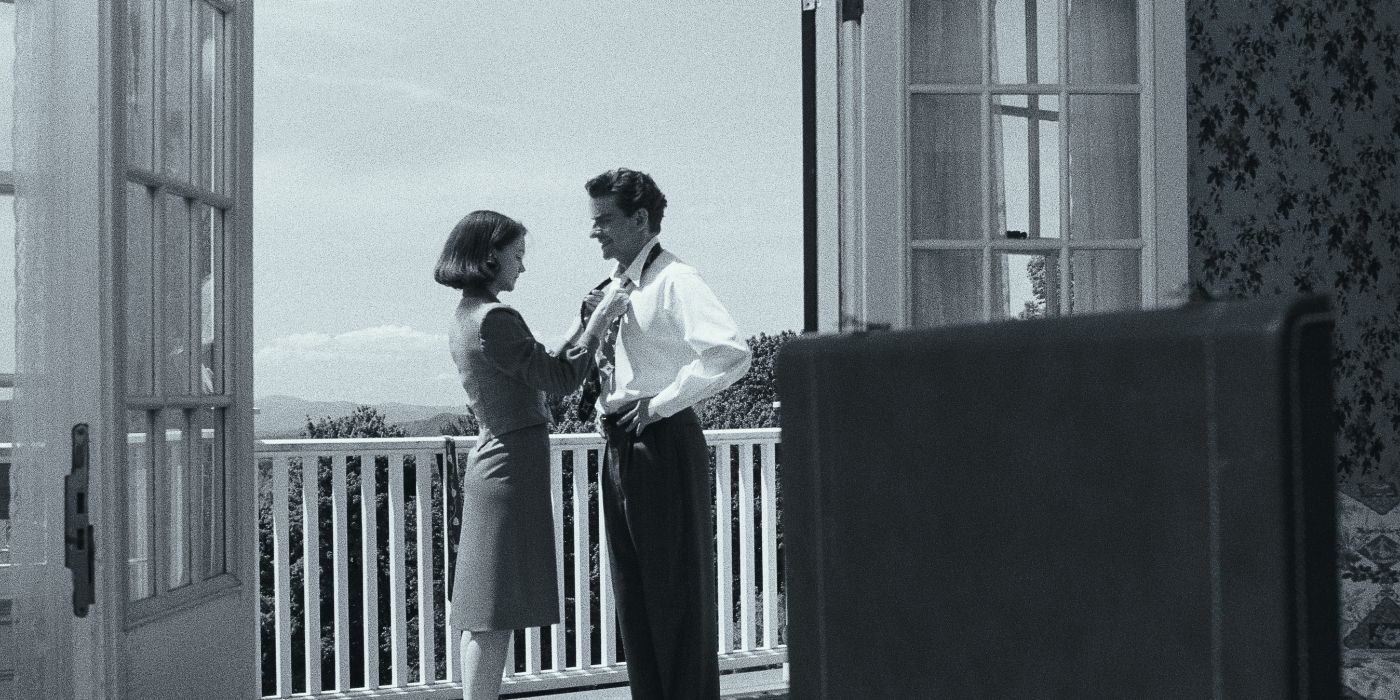The Big Picture
- Maestro is a biopic that challenges the assumption that Leonard Bernstein and Felicia Montealegre’s marriage was a facade to hide Bernstein’s homosexuality.
- Despite the challenges they faced, including Bernstein’s affairs, the couple had a deep and unending love for each other that transcended their unconventional relationship.
- Bernstein’s fame and audacious behavior, combined with his affair with Tom Cothran, ultimately led to the collapse of his marriage with Montealegre, causing him immense remorse and pain.
Music critic Donal Hanahan called composer and conductor Leonard Bernstein “one of the most prodigally talented and successful musicians in American history.” Arguably among the most influential artists in the contemporary music world, Bernstein is the subject of writer-director-actor Bradley Cooper‘s new biopic Maestro. The film, based on an original screenplay by Cooper and Josh Singer, focuses on the stormy and often heartbreaking relationship between the troubled musical genius (Cooper) and his wife Felicia Montealegre (Carey Mulligan). Bernstein and Montealegre wed in 1951, had three children, and remained married until she died in 1976, but behind the scenes, it was anything but a conventional relationship. Bernstein was attracted to men, Montealegre was aware of it, and although Bernstein had multiple affairs throughout the couple’s 26-year union, the two had a deep and seemingly unending love for each other. The story of the Bernstein-Montealegre marriage is a study of the power of an emotional bond that transcended the physical and that could not be undone.
Maestro
This love story chronicles the lifelong relationship of conductor-composer Leonard Bernstein and actress Felicia Montealegre Cohn Bernstein.
- Release Date
- December 20, 2023
- Rating
- R
- Runtime
- 129 minutes
- Main Genre
- Drama
- Genres
- Music , Biography , Drama
- Producer
- Martin Scorsese, Bradley Cooper, Steven Spielberg, Fred Berner, Amy Durning, Kristie Macosko Krieger
- Distributor(s)
- Netflix
What Is ‘Maestro’ About?
Inside social and show business circles, it has long been assumed that the marriage of Bernstein and Montealegre was a facade; a business arrangement that would hide Bernstein’s sexuality, protect his reputation, and preserve his career at a time when even the suspicion that a person might be gay could destroy not only their livelihood, but their life. Maestro attempts to dispel the myth that Bernstein and Montealegre’s marriage was one of convenience.
As the film’s trailer indicates, the couple met at a New York dinner party in 1947, and there was a true mutual attraction, although more intellectual than physical, driven by shared interests and passions. Bernstein, 28, was forging a career as a musical conductor, and 24-year-old Montealegre was a pianist and actress working on the Broadway stage. The couple became engaged just months after their first meeting, but within a year, they parted ways. Montealegre had a brief relationship with actor Richard Hart (TV’s The Adventures of Ellery Queen), but following Hart’s untimely death at age 35, Bernstein and Montealegre were once again drawn together, marrying in 1951.
What Drew Leonard Bernstein and Felicia Montealegre to One Another?
Montealegre was not unaware of the challenges she faced as the wife of a man driven by an almost obsessive passion for his music, as well as his inability to remain a faithful partner, but she was committed to making her marriage work. In a letter to her husband written shortly after their wedding, Montealegre described both her devotion to Bernstein and her acceptance of their situation: “You are a homosexual and may never change – you don’t admit to the possibility of a double life, but if your peace of mind, your health, your whole nervous system depends on a certain sexual pattern, what can you do?”
For his part, Bernstein shared the same intensity in his love for Montealegre, and according to a New Yorker article, the couple’s daughter Jamie felt “he could not live openly as a gay man, but he couldn’t stop loving his wife, either, and he felt terribly guilty about what he put Felicia through.” It’s clear that Montealegre admired and drew life from a man engrossed in his dedication to music, and that Bernstein found in Montealegre both a sense of stability and creative inspiration.
As His Fame Grew, Leonard Bernstein’s Behavior Became More Brazen
Despite an inextricable bond, the couple’s marriage was headed toward an inevitable collapse, unable to withstand the heaviness of longings that couldn’t be satisfied, secrets that couldn’t be quieted, and an innate division impossible to narrow. Bernstein’s star continued to rise – he won a Best Musical Tony for 1953’s Wonderful Town, an Oscar nomination for his 1954 On the Waterfront score, and a slew of Grammys and Emmys – and with his fame came increasingly audacious behavior. While Montealegre found herself slipping more into the background, Bernstein became more brazen about his ongoing affairs, taking little care to conceal them from his wife. Although early in his marriage, the composer had undergone psychiatric treatment to try and “cure” himself of his attraction to men, as his relationship with Montealegre became more strained, he essentially abandoned any pretenses. Bernstein engaged in liaisons with a number of men, and it was rumored he and long-time friend and music collaborator David Oppenheim (played by Matt Bomer in Maestro), who at the time was married to actress Judy Holliday, were involved with each other.

‘Maestro’ Review: Bradley Cooper and Carey Mulligan Are Magnificent in Musical Portrait
Thankfully, ‘Maestro’ is not your typical biopic, despite what the trailer might have you think.
In 1971, Bernstein met a young San Francisco radio music director named Tom Cothran (portrayed by Gideon Glick in Maestro), and it was this relationship that ultimately caused his marriage to Montealegre to disintegrate. Bernstein was unwilling to keep his affair with Cothran concealed, so Montealegre gave Bernstein the option of ending things with his young lover or moving out altogether. Bernstein left his wife and went to California with Cothran. The young man, in some ways, attempted to replace Montealegre as Bernstein’s muse. Cothran predicted the flop of Bernstein’s 1976 musical, 1600 Pennsylvania Avenue. The production was indeed a flop, marking a low point in Bernstein’s otherwise stellar career, but he remained with Cothran until 1977. Despite his love for Cothran, Bernstein continued to have affairs with other men throughout their relationship.
When Leonard Bernstein Lost his Wife, He Lost His Way
Soon after splitting with Cothran, Bernstein discovered that Montealegre had been diagnosed with lung cancer. Their years together may have at times been filled with anguish, but an intense love and mutual respect remained between the two, and Bernstein returned to New York to care for his estranged wife until she died in 1978. By all accounts, Bernstein was racked with remorse and pain following Montealegre’s passing, feeling his behavior during their marriage had somehow contributed to her illness and demise. He had lost the true love of his life, a woman who embraced her husband for who he was when she could have easily walked away, and who remained devoted to a man who could never fully return to her all the genuine love she had given to him. Bernstein sought to numb his pain with drugs, alcohol, and a series of sexual liaisons, ultimately dying of heart failure in 1990 at the age of 72.
In Maestro‘s trailer, Cooper as Bernstein recites a poetic and prophetic phrase attributed to his wife: “If summer doesn’t sing in you, then nothing sings in you. And if nothing sings in you, then you can’t make music.” This encapsulates the core of the couple’s bond. Bernstein and Montealegre made each other sing, and when one of those voices was silenced, summer ended, and the music stopped completely.
Maestro is streaming on Netflix in the U.S.
Watch on Netflix
Source link


